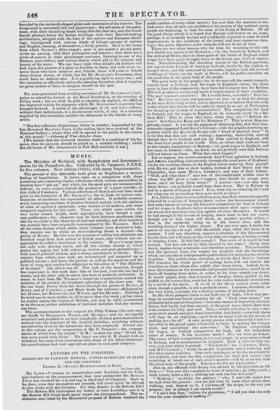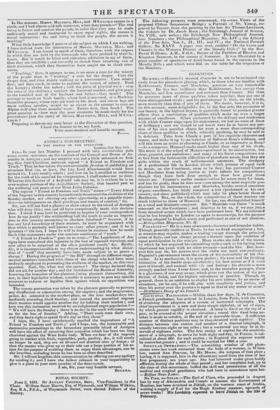LETTERS ON THE COLONIES.
ADDRESSED TO VISCOUNT HOWICK, UNDER-SECRETARY OF STATE FOR THE COLONIES.
LETTER. X.—Svnica's Reseaseanisme IN KENT.
1st June 1931. Loan—I venture to congratulate your Lordship and our Colo- nial brethren on the announcement, that your predecessor Mr. Hoasce Twiss has resumed his wig and bag in the Court of Chancery. Such as he, then, even they themselves are assured, will never again be allowed to play tricks with the Colonies. For this, thanks to the Reform Bill ! The Reform Bill interrupted my letters to your Lordship; and it is the Reform Bill which leads me to renew the correspondence. The ex. citement occasioned by the Ministerial proposal of Reform rendered the public careless of every other matter; but now that the question is set- tled—now that all men are confident of the success of the national cause, people are beginning to look for some of the fruits of Reform. Of all the good things which it is hoped that Reform will bestow on us, none, perhaps, is so earnestly desired and confidently expected as some decided. improvement in the condition of the lowest and most numerous class. Upon this point, therefore, a few remarks will not be out of time.
There are two other reasons why the time for recurring to this sub- ject should not appear to be ill-chosen,—viz. the famine in Ireland, and
the revival of SWING fires in those parts of the South of England where wages have been again brought down to the lowest rate short of starva- tion. Notwithstanding the absorbing nature of the Reform question, the reports front Ireland of starvings to death, deaths by the typhus or hunger fever, and life sustained by sea-weeds, together with the revived' chalkings of SW LW* on the wails at Dover, will fix public attention on the condition of the great body of the people.
The great body of the people—for so we may call the needy competi- tors for land in Ireland, and for wages in England—these, the three parts in four of the community, have been led to expect that the Reform Bill will produce a sudden and marked improvement of their condition._ The poor ignorant creatures ! Do I so calIthem, scornfully ? God for-
bid ! But they are poor and ignorant,—so pour as to long for change
as fat men tlyine long to live, and so ignorant its to believe that the evils under which they lala our will he suddenly cured by an act of Parliament for changing our system of representation ! The competition for land in Ireland, and for wages in England, to be instantly cured by a Re-. form Bill ! This is what they mean when they cry—" Reform for •
ever ! God bless the King and his Ministers !" This is what they con- fidently expect. It was for the purpose of obtaining this, that they una-
nimously supported Lord GREY'S Cabinet— with the grand converting an.
gument which the Quarterly Review calls " dread of physical force." It is for this that they are now waiting ; appearing, meanwhile, starved
though they be in Ireland, and not far from starved in England, still the most loyal people in the world. This, on which their souls are bent. as the instant consequence of Reform,—viz. good wages in England, and low rents in Ireland,—this, my Lord, we are perfectly sure that Reform
will not bestow on them. That then must happen ?
Let us suppose the worst—renewed Anti-Union agitation in Ireland, and SWING travelling industriously through the rural parts of England;. whilst the working classes of the English towns make up their quarrel with lIttsr, and take as their leaders, instead of Earl Gnat and the Chancellor, that same HUNT, CORBETT, and men of their kidney.
" Well, and what then ?" says one of the comfortable middle class to
whom the Bill gives a vote—" suppose they should be savage once more, can't- we keep them down ?" I answer—yes—you may keep them down: you probably would keep them down. But is Reform to end in a system of keeping down ? If so, what are we shouting for ? and for what are we persuading these poor devils to shout ?
It is, I believe, plain to most reflecting men, that Reform must be 'speedily followed by a system of keeping down, unless the Government should-
find some means of curing the excessive competition for land in Ireland.
and for wages in England, before disappointment shall again emsperate• the lowest and most numerous class against all above themselves. It would
be bad enough if the system of keeping down were to last tea years;.
though not so bad, some will think, as another possible event,— that is, the successful rising up of the lowest class, and the tumbling down of the higher classes. For my own part, I doubt the- power of any class to cope with the middle class, when the latter is in earnest. I will not, therefore, suppose a rebellion of the discontented lowest class, but will state, as the worst that can happen, a lasting system of keeping down. Is this had enough ? Ten years of it would be bad enough. Yet how are we to limit the evil to ten years ? Being kept down, implies being miserable, and therefore ignorant. The miserable and the ignorant want the respect for property and the knowledge which are considered indispensable qualifications for enjoying the elective franchise. The middle class, therefore, to which Earl GREY'S Reform Bill transfers the whole power of making laws, will not bestow the- franchise on those whom that middle class keeps down. Indeed, to be- stow the franchise on the miserable and ignorant lowest class, would be to leave off keeping them down, or rather to let them tumble you down: It would appear, then, that a system of keeping- down, applied by the middle to the lowest class, must last for ever, unless suddenly overthrOwn by a revolt of the slaves. A revolt of the slaves against every other class, though a possible, is not a probable event. I assume, therefore, as the very worst, a system, but a lasting system, of keeping down. In this black prospect there is one little ray of light, which may per- haps be nursed into broad sunshine for all. "Find some means," say philanthropists and philosophers. " find some means of improving the con-
dition, first bodily and then mental, of the great mass: fatten them first with comfort for body and soul. Next,—which will then be easy,—im. prove their morals and give them knowledge. And lastly,—to which there
will then be no objection,—give them an equal share in the power cf making laws for all.' A very pretty process with a beautiful ntsult !- hut what is the grand agent wherewith to begin by making the hungry
sleek, and comforting the care-worn ? In England competition. for wages, in lreland competition for land, are the immediate cause of misery. Is the discovery made ? No; we must go deeper. The cause of both competitions is eyeess of people, in proportion to land in Ireland, and to employment in England. Find a cure for this ex- cess, and your object is gained. " We have it,'' say MALTII u s, MIL r., and al‘Cur.coen ; " teach the people to practise moral restraint, and the fatal excess vanishes. Stop early marriages, or let the marriages be less fruitful, and then the dire competition for land and wages—the snatching of bread out of each other's mouths—will be at an end with the great body of the people. You may do this BY TEACHING."
Just so, one afflicted with dropsy was advised by his physician as fol- lows :—" You owe this complaint to want of exercise ; go take a walk ; walk twenty miles a day ; nothing can save you but WALKING." " Walking ! " exclaims the patient; " why, I can't lift either foot an inch from the ground : cure me this time by some other means than walking, and, depend on it, I wilt keep off the dropsy in the way you propose; but at present I am unable to stir."
" I can't help that," rejoins the physician; " I tell you that the only cure for your complaint is walking " In like manlier, Messrs. MALTHUS, Mite, and M'Cum.ocu reason in a circle, and I had almost said talk nonsense, when they preach—" The end being to fatten and comfort the people, in order that they may be made sufficiently moral and instructed to enjoy equal rights, the means is moral instruction : the end being to teach the people, the means is teaching."
What little knowledge I possess of the subject on which I am writing, I have derived from the instruction of Messrs. Mateues, Alue., and M'Cuesocu. I am bound to speak of them, therefore, with the respect in which they are held by the thousands who have profited by their la- bours. But it would be blind and ridiculous adulation to say of them, that they are inf llible ; and cowardly to shrink from attacking one of their doctrines, which they themselves have taught me to think erro- neous.
" Teaching," then, it appears to me, is no more a cure for the misery
of the people than is " walking" a cure for the dropsy. Cure the dropsy first, and then enjoin walking as a preventative. Cure misery first, and then leach, in order to prevent the return of misery. Feed the hungry ; clothe the naked ; still the pains of physical want ; stop the cries of the children ; comfort the harassed mother, and give peace to the troubled soul of the husband and father—then teach ! The attempt to teach an Irish family, whose food is sea-weed, or a Bucking- hamshire peasant, whose eyes are sunk in his heath and whose legs are mere calfless spindles, would be as clever as the attempt to cotes an Alpine wolf after three months' snow. Fatten first, then teach ! The great question is—how may the poor creatures be made ready for the preventative (not the cure) of Messrs. Mairuus, MILL, and 3PC ye- LOCH ?
Proposing to devote my next letter to the discussion of that question, I have the honour to be, my Lord, Your most obedient and humble servant,



























 Previous page
Previous page